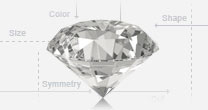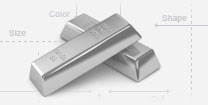- Diamonds
- Engagement
- Jewelry
- Education
- Learn about Diamonds
- Learn about Metals
- What to expect when buying a ring
- Custom Design Process
- The Diamond 4 C's
- How To Care For Your Jewelry
- How To Plan A Wedding
- Picking an Engagement Ring
- Top 10 Ways To Propose
- The Meaning Behind Shapes and Colors of Diamonds
- Advice for Grooms
- The Natural History, Mythology, and Symbolism of Popular Gemstones
- The Bridal Style Checklist
- The Economics of Engagement Rings
- How to Keep Your Diamonds Safe from Theft or Damage
- How to Create the Perfect Christmas Proposal
- The Secret Guide for Authentic Engagement Photos
- How to Plan the Perfect Marriage Proposal
- Best Seasons to Get Married In
- About Us
Platinum Durability, Color, and Value
Platinum is a dense, lustrous, silvery-white malleable metal. In recent years, it has become one of the most popular precious metals used in fine jewelry.
-

Platinum Durability
Platinum's popularity stems not only from its alluring beauty, but also from its practicality. In addition to its beautiful sheen and its sleek appearance, platinum is also extremely durable. In fact, it is significantly more durable than both silver and gold. Silver and gold are relatively soft and malleable metals which can easily chip, scratch or wear. Platinum, however, may look scratched or aged, but the metal will never chip or wear away. Additionally, platinum doesn't tarnish, it is one of the only hypoallergenic precious metals on the market, and can withstand exposure to high temperatures. When it comes to fine jewelry, platinum is a great option. As such, platinum jewelry is especially recommended to consumers who have an active lifestyle, and are looking for jewelry that can withstand a little wear and tear.
-
.jpg)
Platinum Color
This precious metal's natural silver-white luster makes it an especially attractive metal. Unlike white gold, platinum is corrosion resistant, and since its color does not fade away or wear off, it does not need to be plated with additional layers of rhodium. Platinum's versatile hue makes it an increasingly popular precious metal used in a variety of jewelry designs and styles.
-
.jpg)
Platinum Value
Platinum is also an extremely rare metal. This rarity increases its value, making it more valuable than both gold and silver. Due to its density, platinum is also significantly heavier than gold or silver; a characteristic that adds to the metal's worth.
Platinum Alloys
Like most other precious metals, pure platinum is alloyed when used in fine jewelry. Six slightly different metals belong to the Platinum Group of Metals (PGM): platinum, iridium, palladium, ruthenium, rhodium and osmium. Nearly all fine platinum jewelry is composed of the purest platinum alloy: 95% pure platinum mixed with 5% iridium, palladium or ruthenium to strengthen the metal. These pieces should always be marked with "950 Plat" or "Plat" to indicate their high quality.
Platinum Care
If you prefer your platinum jewelry to look as shiny and new as possible, make sure it's safely stored and regularly cleaned. Platinum jewelry is known for developing a 'patina', a fuzzy sheen that can make it look brushed, and while many people enjoy this look, some prefer a cleaner finish. To recapture the original shine, try soaking your platinum jewelry in a mild solution of warm, soapy water. If necessary, use a toothbrush or an eyelash brush to gently scrub the metal jewelry clean. Otherwise, bring your jewelry to our store for a professional polish.










